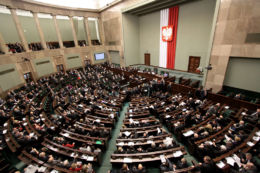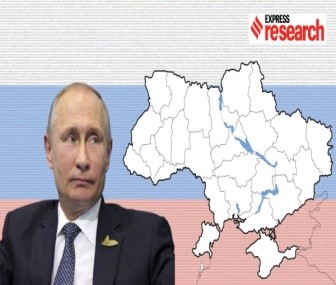The Eternal Recurrence of the Same: The New Liberal Government in Poland
The most probable scenario came to pass in the aftermath of the 2023 Polish parliamentary elections (see my report on it here). To sum up events: The conservative Prawo i Sprawiedliwość (Law & Justice, or PiS) party, which had been in power for the two terms, won the most votes, but not enough to gain the total majority of seats in the Parliament). President Andrzej Duda, who was originally from PiS, asked Mateusz Morawiecki, PiS’ former Prime Minister, to form a government. Morawiecki was unable to convince any other party to form a coalition with PiS, and thus had to form a one-party PiS government which did not manage to win a vote of confidence in Parliament.
After this, Duda asked Donald Tusk, the leader of the second-place party of the elections, Koalicja Obywatelska (Citizens’ Coalition, or KO, a new incarnation of the liberal Platforma Obywatelska/Citizens’ Platform party, which had governed for two terms before PiS won the elections in 2015). Tusk has entered a coalition with Trzecia Droga (Third Way, an unlikely alliance of the liberal Polska 2050/Poland 2050 party and the agrarian Polskie Stronnictwo Ludowe/Polish People’s Party) and Nowa Lewica (New Left, a coalition of small Leftist parties). Given that this liberal coalition has a majority of votes in Parliament, a new, liberal government with Donald Tusk as Prime Minister has easily won the vote of confidence.
Since both the Polish and the foreign media are portraying recent events in a sensationalist tone as some sort of revolution, let me analyze it, along with some diagnoses and predictions.
First of all, I would like to spoil the fun for everyone and state that, despite the public discussion being quite heated here in Poland, this is not a revolution, but an eternal recurrence of the same, with liberals and conservatives ruling alternately in Poland (as in many other European countries). Yes, from a nationalist perspective it is a bad thing that the liberals have won, but Polish liberals are not as bad as the Right-wing media portray them, and Polish conservatives are not as good as the liberal media’s descriptions, which are an attempt to smear them, make them out to be.
The main thing we can learn from recent events is that the liberals are the opposite of the conservatives: They speak very softly, but act very harshly. The PiS government was very harsh when talking about their opponents, but rather soft when dealing with them. This might be the result of the conservative inferiority complex, as well as their concern with what the liberal media are saying about them. PiS politicians talk a lot about the dangers of the LGBT ideology, but never did anything to stop pride marches and event; quite the contrary, it was during the PiS government that Poland saw the most “pride” marches, with the police brutally cracking down on any counter-protesters. PiS politicians were very hostile when talking about illegal immigration, but they did nothing to combat the non-governmental organizations (NGOs) that are smuggling illegal immigrants into Poland from Belarus. On the contrary, these NGOs have received state grants and police protection, while those patriots who have tried to stop them have been fined and jailed. Donald Tusk and his KO party are very soft when it comes to their rhetoric, claiming that they want to create “a nice Poland for everyone.” But since the very first day they were in office, they have been using harsh measures to crack down on anyone connected with the previous government.
A good example of this is the recent affair with the Polish public media, especially television. In Poland, as in most European countries. we have the privately-owned media and state-owned public media, including radio and television. The three largest media broadcasters in Poland are two private networks and one public network. The public media is on the same level in terms of both quality and quantity as the private broadcasters, but public media is legally obliged to fulfill the “public media’s mission.” This means that apart from regular broadcasting, they have to also focus on “high culture,” including classical music and operas broadcasts, TV theater/drama, serious documentaries, and so on regardless of their ratings. Basically, they get public funding but are obliged to create quality high-culture content, even if only a fraction of the public is watching it. Polish politicians are most interested in the public media’s news programming, as these focus directly on politics, and the politicians believe that they influence the outcome of the elections. (Research shows that this is in fact not true, but politicians seldom worry about facts.)
Whoever is in power in Poland controls the public media, and from the very beginning of the existence of public media in Poland, they always portray whoever is in power in a positive light. When Tusk was in power, he was portrayed as the savior of the nation, and Kaczyński was portrayed as an evil plotter; when Kaczyński was in power, it was the other way around. This is how it goes in the Polish public media. Since he became Prime Minister again, Tusk appointed Bartłomiej Sienkiewicz as Minister of Culture. Now, Sienkiewicz, despite being the great-grandson of the Polish Nobel Laureate and writer Henryk Sienkiewicz, has nothing to do with culture. He is a former officer of the Polish Office of State Protection (the democratic political police) and an infamous former Minister of Internal Affairs who was responsible for brutal crackdowns on the Polish Independence Day marches. But the Polish public media are governed — indirectly — by the Ministry of Culture. Sienkiewicz’s sole job is therefore to kick out everyone connected with the PiS government. So far he has unlawfully appointed new directors of public television, unlawfully terminated the labor contracts of various journalists and administrative employees, and used shady private security companies that are involved in organized crime and the brutal takeovers of privatized public housing blocs in Warsaw to physically take over the public television’s headquarters.

You can buy Greg Johnson’s Toward a New Nationalism here.
So this is the new liberal Poland: smiling and nice to their own, but willing to break the law and use physical force against everyone else. But we must emphasize that this is generally how liberals work everywhere: Justin Trudeau, Emmanuel Macron, and Olaf Scholz are just as duplicitous and willing to use force as Tusk is.
The coalition led by Donald Tusk is quite shaky and unstable, however, with the Third Way component pushing towards the Right, and the New Left pushing (obviously) towards the Left. However, it is already clear that most of the promises made by Tusk before the elections will not be kept. Tusk promised that there will be no budget deficit; the budget for 2024 will have the highest deficit ever. Tusk promised that the public media will be shut down; the public media will in fact be taken over by the liberals and keep broadcasting. Tusk promised to cut down public media funding to zero; in 2024 the public media will receive a record-breaking funding of three billion Polish złotys (approximately $770 million USD). Tusk promised to liquidate the “Church fund,” which is the part of the Polish state budget used to finance the social security and health care of the priests of the various denominations, and which also supports the charitable and educational efforts of the churches in Poland. The “Church fund” in 2024 will be a record-breaking 257 million złotys (approximately $66 million USD). Polish liberals and Leftists were hoping that the liberal government will legalize abortion under any circumstances, but Third Way have already declared that they will not support such a change. Liberals and Leftists were also hoping for a legalization of same-sex marriages in the form of civil unions in Poland, but the Polish People’s Party have already declared that they will not support such legislation.
Thus, despite of all the hysteria on both sides of the political spectrum, I predict that not much will change in Poland — and that is a good thing in many cases. The new liberal government will take over the public institutions, just as any new government does; but as they are liberals, this will be done much more harshly.
When it comes to a positive lack of changes in Polish politics, I predict that the new liberal government will not change the anti-Russian — or anti-neo-soviet, to be more precise — course of Polish politics. Poland will still support Ukraine and be one of the main coordinators of Western aid for Ukraine in the war. Poland will not stop its military reforms, which are aimed at increasing the number of soldiers as well as the quality and quantity of military equipment. Poland will not stop protecting its border with Belarus in order to keep those immigrants being smuggled in by the Lukashenko regime out of Poland. One of the main reforms introduced by the PiS government was the introduction of large social aid programs, and these will not be overturned by the liberal government — given that anyone who tries to overturn these now will lose the elections immediately. However, I predict that there will be no new social aid programs introduced — which is a bad thing.
When it comes to a negative lack of changes, I predict that the liberal government will not overturn the biggest mistake made by the PiS government, which was the introduction of millions of legal immigrants to Poland. While letting in white immigrants, apart from refugees, from Ukraine and Belarus is problematic, letting in non-white immigrants from Asia and Africa is a catastrophe that is already bringing terrible consequences to Poland. It could possibly turn Polish cities into crime-ridden literal “shitholes” like we see in Western countries.
The main negative change I predict in the coming years will be Polish relations with the European Union. Tusk is a great supporter of German mainstream politicians (and they publicly name him “our guy in Poland”), so this means that Poland will stop opposing all federalization plans and accept any number of migrants that Brussels — or rather Berlin — dictates. Again, these ethnic issues are the most crucial ones when it comes to the physical survival of the Polish nation, and thus I see them as the most important issues at stake.
There is only one positive change which I predict: making life easier for domestic small business owners. The PiS government increased taxation and made the law much more complicated, and thus more difficult to follow, which caused this part of Polish society to support the liberals. Although I must stress that this is something I merely hope for, as I am not sure that the liberals will keep their promises.
Another big mistake that Tusk has already made is the introduction of Leftists into the government. The Left controls now the ministries of Digitalization; Family, Work, and Social Politics; Equality (!); and Science, with other Leftists taking prominent roles in the ministries of Education, Internal Affairs, and Climate. As we all know, Leftists have no reservations when it comes to pushing their own destructive agenda once they are in office. I predict that we will see lots of the Leftist agenda and indoctrination in Polish schools, social policies, and academia, as well as lawfare against nationalists. However, I also predict that this will cause internal conflicts within the liberal coalition and discontent within large segments of Polish society.
In summary, some things will change, but most will not. Despite all the media’s noise, this is just a change of government in Poland, not a revolution. It is a bad thing that the liberals have won, but I do not predict a collapse. I also think that many of the negative changes that will possibly be introduced by the liberal government will cause growing discontent in Poland, which will result in a victory of the conservatives in 2027 or 2031.




